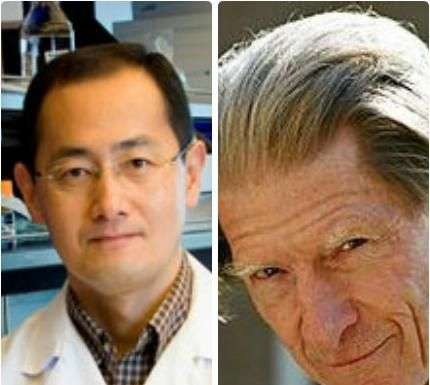英国科学家约翰・格登和日本科学家山中伸弥因在细胞核重新编程研究领域的杰出贡献获得2012年诺贝尔生理学或医学奖,两人将分享120万美元(约合人民币757万元)的奖金。英国获奖科学教约翰・格登获奖后表示,15岁时,他的生物课成绩在250名同年龄的男生班中排最后一名,在其他科学类学科中成绩也都垫底。老师对他的评价是“在大学搞科学纯粹是浪费时间”。写有这句评价的成绩报告单被格登装在相框里摆在书桌上,一直到现在。格登介绍说,给他评价的那位老师原本是博物馆的讲解员,后来受雇到学校给“后进生”讲课。接到那样一张成绩报告单之后,格登放弃之前研习科学的打算,专修古典文学;在牛津大学基督教堂学院学习期间又阴差阳错转读了动物学。在牛津大学读研究生时,他发表了有关基因学的一篇突破性研究报告,首次证明生物体内的每个细胞都有同样的基因。这份报告最初发表时饱受争议,但正是这份报告带动了后来韦莫特教授所做的克隆羊多莉、以及山中伸弥以皮肤细胞制造出干细胞等研究,堪称重要先驱。

 |
|
British scientise John Gurdon and Japanese stem cell researcher Shinya Yamanaka have been awarded the Nobel Prize in medicine or physiology. |
A British scientist whose schoolmasters told him he was too stupid to study the subject has been awarded the Nobel Prize in medicine or physiology for his pioneering work on cloning.
At the age of 15, Prof Sir John Gurdon ranked last out of the 250 boys in his Eton year group at biology, and was in the bottom set in every other science subject.
Sixty-four years later he has been recognized as one of the finest minds of his generation after being awarded the £750,000 annual prize, which he shares with Japanese stem cell researcher Shinya Yamanaka.
Speaking after learning of his award in London on Monday, Sir John revealed that his school report still sits above his desk at the Gurdon Institute in Cambridge, which is named in his honor.
While it might be less than complimentary, noting that for him to study science at University would be a "sheer waste of time", Sir John said it is the only item he has ever framed.
The master, a Mr Gaddum, was in fact a museum curator by profession who had been hired to teach the lowest-achieving pupils and was not in fact a particularly effective teacher, he explained.
He said: "The main gist of it was that he had heard Gurdon was interested in doing science and that this was a completely ridiculous idea because there was no hope whatever of my doing science.
"When you have problems like an experiment doesn't work, which often happens, it's nice to remind yourself that perhaps after all you are not so good at this job and the schoolmaster may have been right."
After receiving the report Sir John said he switched his attention to classics and was offered a place to study at Christ Church, Oxford, but was allowed to switch courses and read zoology instead because of a mix-up in the admissions office.
It was at Oxford as a postgraduate student that he published his groundbreaking research on genetics and proved for the first time that every cell in the body contains the same genes.
He did so by taking a cell from an adult frog's intestine, removing its genes and implanting them into an egg cell, which grew into a clone of the adult frog.
The idea was controversial at the time because it contradicted previous studies by much more senior scientists, and it was a decade before the then-graduate student's work became widely accepted.
But it later led directly to the cloning of Dolly the Sheep by Prof Ian Wilmut in 1996, and to the subsequent discovery by Prof Yamanaka that adult cells can be "reprogrammed" into stem cells for use in medicine.
This means that cells from someone's skin can be made into stem cells which in turn can turn into any type of tissue in the body, meaning they can replace diseased or damaged tissue in patients.
Sir John admitted it would have been "particularly nice" if Prof Wilmut had been given a third share of the award, but said he would celebrate nonetheless with a drinks reception at Cambridge last night.
He joined the university in 1971 following spells at the California Institute of Technology and Oxford, and in 1989 was a founding member of the Wellcome/CRC Institute for Cell Biology and Cancer - later renamed the Gurdon Institute - where he still works full-time at the age of 79.
He revealed that he had first heard about his prize when an Italian newspaper telephoned him in his laboratory to ask for his reaction at 7.30am on Monday morning, but dismissed their information as speculation.
An hour later he received a call from the Swedish Academy telling him he had won the prize, but admitted he was initially suspicious that the call was a hoax by a friend or colleague speaking in a Swedish accent.
Sir John professed to be unaware of the cash prize that awaits, but said he would most likely invest it in a fund he has previously set up to support PhD students during their fourth year of study.
He added that he would be back in the lab where at his customary early hour this morning. "It isn’t going to be particularly productive to clear off to some exotic place and I don’t have a yacht,” he explained.
Sir John's award could be followed by another British success if Prof Peter Higgs is given the Nobel Prize for physics after the discovery of a particle matching his 50-year-old theory by Cern this year.
But despite the public clamour for Prof Higgs to win the award after the huge public interest in his work, the fact the Cern results have not yet been verified by independent researchers may prove a stumbling block.
相关阅读
(Agencies)

(中国日报网英语点津 Helen)